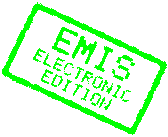Quasi-Minuscule Quotients and Reduced Words for Reflections
John R. Stembridge
DOI: 10.1023/A:1011260214941
Abstract
We study the reduced expressions for reflections in Coxeter groups, with particular emphasis on finite Weyl groups. For example, the number of reduced expressions for any reflection can be expressed as the sum of the squares of the number of reduced expressions for certain elements naturally associated to the reflection. In the case of the longest reflection in a Weyl group, we use a theorem of Dale Peterson to provide an explicit formula for the number of reduced expressions. We also show that the reduced expressions for any Weyl group reflection are in bijection with the linear extensions of a natural partial ordering of a subset of the positive roots or co-roots.
Pages: 275–293
Keywords: Coxeter group; reflection; minuscule; reduced word; weak order
Full Text: PDF
References
1. A. Bj\ddot orner, “Orderings of Coxeter groups,” Contemporary Math. 34 (1984), 175-195.
2. N. Bourbaki, Groupes et Alg`ebres de Lie, Chp. IV-VI Masson, Paris, 1981.
3. L. Comtet, Advanced Combinatorics, Reidel, Dordrecht, 1974.
4. M.D. Haiman, “Dual equivalence with applications, including a conjecture of Proctor,” Discrete Math. 99 (1992), 79-113.
5. J.E. Humphreys, Reflection Groups and Coxeter Groups, Cambridge Univ. Press, Cambridge, 1990.
6. R.A. Proctor, “Bruhat lattices, plane partition generating functions, and minuscule representations,” Europ. J. Combin. 5 (1984), 331-350.
7. R.A. Proctor, “Minuscule elements of Weyl groups, the numbers game, and d-complete posets,” J. Algebra 213 (1999), 272-303.
8. R.A. Proctor, “Dynkin diagram classification of λ-minuscule Bruhat lattices and of d-complete posets,” J. Alg. Combin. 9 (1999), 61-94.
9. R.P. Stanley, “On the number of reduced decompositions of elements of Coxeter groups,” Europ. J. Combin. 5 (1984), 359-372.
10. R.P. Stanley, Enumerative Combinatorics, Vol. I, Cambridge Univ. Press, Cambridge, 1997.
11. J.R. Stembridge, “On minuscule representations, plane partitions and involutions in complex Lie groups,” Duke Math. J. 73 (1994), 469-490.
12. J.R. Stembridge, “On the fully commutative elements of Coxeter groups,” J. Alg. Combin. 5 (1996), 353-385.
13. J.R. Stembridge, “Minuscule elements of Weyl groups,” J. Algebra, 235 (2001), 722-743.
2. N. Bourbaki, Groupes et Alg`ebres de Lie, Chp. IV-VI Masson, Paris, 1981.
3. L. Comtet, Advanced Combinatorics, Reidel, Dordrecht, 1974.
4. M.D. Haiman, “Dual equivalence with applications, including a conjecture of Proctor,” Discrete Math. 99 (1992), 79-113.
5. J.E. Humphreys, Reflection Groups and Coxeter Groups, Cambridge Univ. Press, Cambridge, 1990.
6. R.A. Proctor, “Bruhat lattices, plane partition generating functions, and minuscule representations,” Europ. J. Combin. 5 (1984), 331-350.
7. R.A. Proctor, “Minuscule elements of Weyl groups, the numbers game, and d-complete posets,” J. Algebra 213 (1999), 272-303.
8. R.A. Proctor, “Dynkin diagram classification of λ-minuscule Bruhat lattices and of d-complete posets,” J. Alg. Combin. 9 (1999), 61-94.
9. R.P. Stanley, “On the number of reduced decompositions of elements of Coxeter groups,” Europ. J. Combin. 5 (1984), 359-372.
10. R.P. Stanley, Enumerative Combinatorics, Vol. I, Cambridge Univ. Press, Cambridge, 1997.
11. J.R. Stembridge, “On minuscule representations, plane partitions and involutions in complex Lie groups,” Duke Math. J. 73 (1994), 469-490.
12. J.R. Stembridge, “On the fully commutative elements of Coxeter groups,” J. Alg. Combin. 5 (1996), 353-385.
13. J.R. Stembridge, “Minuscule elements of Weyl groups,” J. Algebra, 235 (2001), 722-743.
